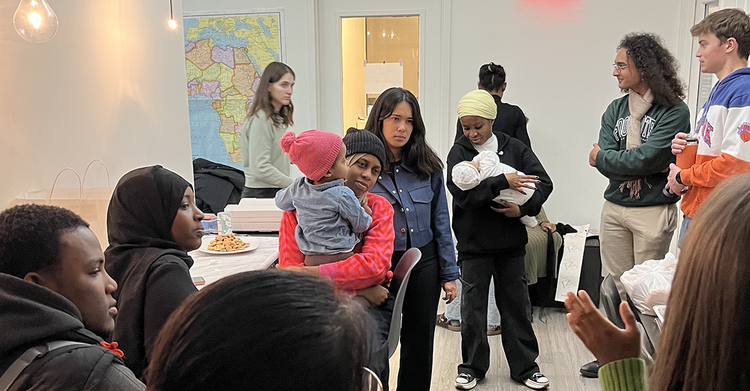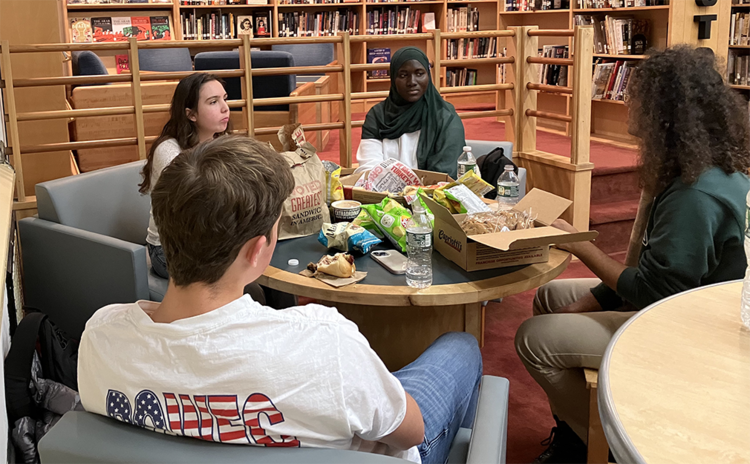FRE 372 Focuses on Community, Migration and the Francophone Diaspora

In the late 2010s, as she was finishing up her PhD work in French and francophone studies at Duke University, Sandie Blaise had an idea for a new kind of course.
Blaise, whose academic research interests include francophone migration and cultural identities, began conceiving of a French class that would bolster academic study with community-based learning and innovation—something she has always been passionate about. As the 2018-2019 Duke Innovation & Entrepreneurship Graduate Fellow, for example, she had explored innovative approaches to supporting linguistic and cultural heritage among French-speaking refugees in the United States, as well as ways to enhance student learning through community outreach.
“For this new course, I wanted to partner with local NGOs and other community groups to expose students to real-world applications of French, and to expand their understanding of the francophone world,” Blaise says.
When she came to Princeton in the fall of 2019, the seeds of her idea began to blossom with the help of Christine Sagnier, director of the French Language Program. Together, Blaise and Sagnier began developing a new, community-minded course, which would be called FRE 372: Migration, Diversity, Diaspora.

FRE 372 students focus on real-world issues, including migration, exile, media portrayals of the francophone diaspora, and the complex relationship between language and identity. Each week of class boasts a different theme, and traditional textbook readings are supplemented with novels such as Ru by Vietnamese author Kim Thúy; graphic novels such as Le piano oriental by Franco-Lebanese author Zeina Abirached; documentaries such as La cité des autres by Rwanda-born Québécois Justice Rutikara; and—critically—in-person engagement with young French speakers in the New York and New Jersey area through partnerships with Project Rousseau and the French Heritage Language Program (FHLP), run by the Albertine Foundation.
In developing FRE 372, Sagnier and Blaise first enlisted the help of Princeton’s Program for Community-Engaged Scholarship (ProCES), which actively supports courses and research collaborations that aim to benefit society through exchanges, experiential learning, and other collaborative modalities.
“Dr. Sagnier and Dr. Blaise worked with ProCES to be very intentional about the community-engaged component and ways of introducing students to the ethical and cultural competencies needed to work effectively with community partners,” ProCES’s Tania Boster and Tara D. Carr-Lemke wrote via email.
These community partnerships, in turn, grew organically. Sagnier and Blaise first connected with the FHLP, which they dubbed “a clear fit” in terms of aligned goals and mutual benefits. Created in 2005, the FHLP aims to assist young, recently immigrated French speakers, many of whom hail from central and west Africa, preserve their cultural identities and prepare them for higher education in the United States through college guidance, test prep, field trips, activities, and workshops.
“Our mentoring program aims to create a nurturing environment where FHLP students can engage in meaningful discussions, receive academic advice, and explore various aspects of their cultural heritage,” explains Yann Gaboriau, FHLP program coordinator. “By connecting with FRE 372 students, FHLP students can gain valuable insights into their identity as francophones and the significance of their heritage within a broader global context.”
At the same time, the partnership would expose Princeton students to novel perspectives and life experiences that would “foster open-mindedness, empathy, and a broader understanding of global issues, contributing to their overall personal and intellectual growth,” Gaboriau says. “These interactions with FHLP members also provide a valuable opportunity for Princeton students to practice their language skills in a real-world context.”
The first iteration of the course launched in Spring 2023, and not long after, Blaise was contacted by Andrew Heinrich, founder and executive Director of Project Rousseau, which provides critical services and legal support for young francophone immigrants, including help with asylum paperwork, housing, food, mentorship, and educational guidance. Blaise and Heinrich had met at a conference.
“When we connected, it was obvious to me that Sandie shares Project Rousseau’s core values of in-depth direct service for the mutual benefit of those being served and those doing the service,” Heinrich says. In the Fall 2023 iteration of the course, students of FRE 372 worked directly with Project Rousseau’s clients on their asylum applications.
“Writing the declaration [portion of the asylum application] is a long and traumatic process for our clients, especially unaccompanied youth. FRE 372 students will learn asylum law and how to write a good declaration to help the clients share their stories, and then translate them into English,” Heinrich says. “Our goals are to create a welcoming environment for our clients to work with FRE 372 students on their declarations, while also hopefully inspiring Princeton students to see how their language skills can help them pursue careers in immigration law.”
The hopes for FRE 372 may be lofty, but students say their experiences manage to exceed these expectations.
“Getting to meet with young immigrants face to face and witness the day-to-day work of these organizations was really special, and it made the themes of the course feel more concrete and immediate,” says Sandra Chen ’24.

“Our trip to New York to visit Project Rousseau's office and the FHLP students at their school was one of the highlights of last semester,” adds Delaney Savidge ’24. “We had the opportunity to translate asylum requests, which was a meaningful way to put to use our skills in French since they will be used to help someone, and also left an impression on me because the stories of the asylum seekers were so heartbreaking, yet the refugees we met later that day were so incredibly resilient and friendly. I was really touched by the work that Project Rousseau does.”
Adds Max Lawrence ’24: “The course taught me a lot about my country and city. I finished the semester more determined than ever that the steady drive to make our country live up to its ideals is worth it.”
Gaboriau notes that FRE 372 is unique because it goes beyond traditional language instruction “to explore the real-world impact of linguistic and cultural identity on individuals and communities. This course emphasizes the practical application of knowledge, encouraging students to apply theoretical concepts to real-world contexts.”
Further, by participating in community outreach initiatives, students gain valuable insights into the ways in which academic scholarship intersects with lived experiences, “ultimately empowering them to effect positive change within francophone communities and beyond,” Gaboriau says.
Heinrich adds that students’ hands-on experience with contemporary French speakers through Project Rosseau has the potential to enrich the personal and professional lives of those hoping to work in law, public policy, or related fields. Additionally, he notes that many of the organization’s clients are young adults, much like Princeton students, which “creates a powerful dynamic for both parties.”
In fact, the response to the course has been so positive that ProCES worked with Project Rousseau to offer a paid summer internship with the organization this summer.
“ProCES is collaborating with Project Rousseau to support a position through our Derian summer internship program,” write Boster and Carr-Lemke. “In addition to learning onsite from Project Rousseau during the eight-week experience, the Derian will also coordinate with Dr. Blaise and Dr. Sagnier to help prepare information relevant to their course collaboration with the organization next academic year.”
FRE 372 will be offered again in Spring 2025.
“The ways in which Dr. Blaise and Dr. Sagnier approach community-engaged pedagogy—emphasizing sustained relationships over time that are responsive to community-identified priorities, while also providing outstanding opportunities for student learning—exemplify the highest principles of community-engaged scholarship,” say Boster and Carr-Lemke.
“The most important thing the course taught me is to be more aware of experiences that may seem far removed from my own,” says Chen. “Listening to the stories of the migrants at Project Rousseau and FHLP, I realized that there were some difficult realities of which I was truly ignorant, as well as certain experiences that really weren't so foreign after all. This course showed me the importance of cultivating a broad vision of the world grounded in open exchange.”
